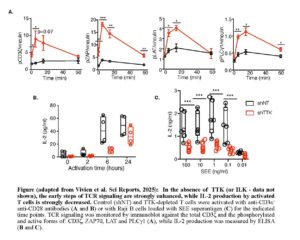T cell activation is critical for adaptive immunity, helping to protect the body from infection and tumors. A key step in this activation is signal transduction downstream of the T cell antigen receptor. This signaling involves several steps, with early ones occurring at the plasma membrane and others that occur later, after TCR internalization. The late steps in TCR signaling remain poorly understood. Since the TCR can signal after its internalization, we postulated that kinases abundantly expressed in T cells may regulate TCR signaling. This study focuses on two such enzymes: integrin-linked kinase (ILK) and threonine-tyrosine kinase (TTK), whose involvement in TCR signaling has not been previously studied. Using specific depletion of TTK and ILK by lentiviral shRNA, we show that in the absence of ILK and TTK, the early steps of TCR signaling are strongly enhanced, while IL-2 production by activated T cells is strongly decreased. These findings are relevant because TTK and ILK are both important targets in oncology, and our results show that their inhibition affects the activation of T cells, which play an essential role in anti-tumor defense.

.png)